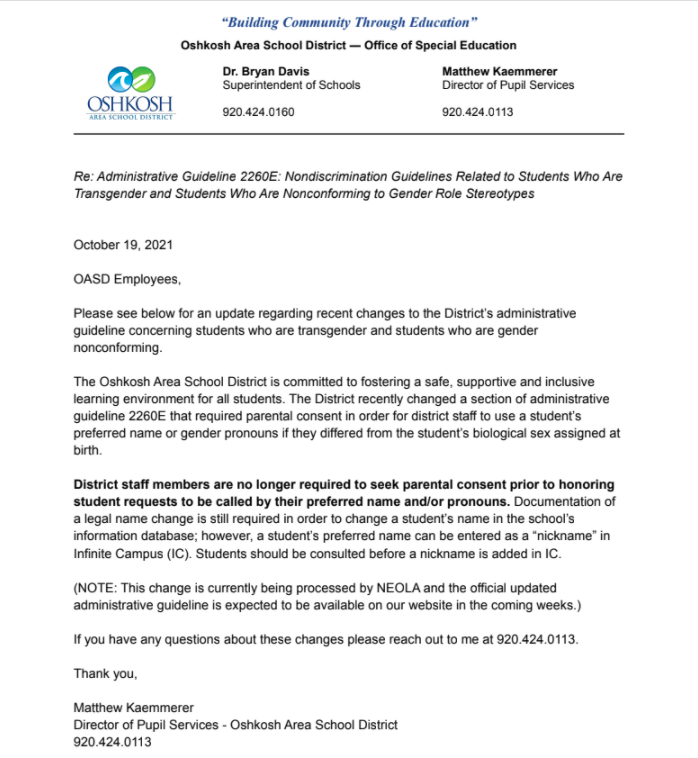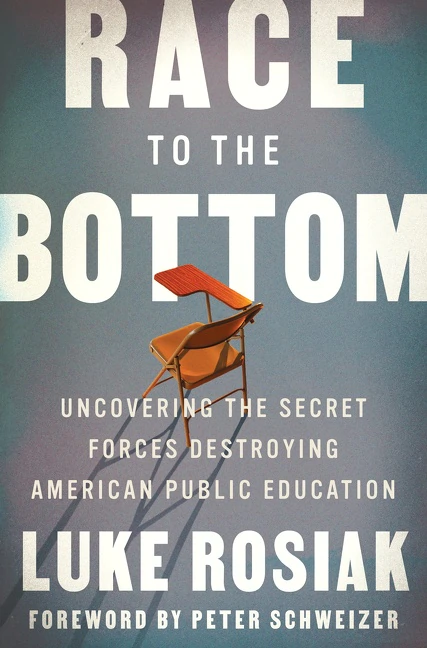Listen on: Apple Podcasts | Spotify
Nelson Mandala once said,
There can be no keener revelation of a society’s soul than the way in which it treats its children.
Nelson Mandela
If you take some time to examine what’s going on in the public school system, and what it’s doing to our children, you’d think America’s soul had been sold to someone hellbent on destroying American values and virtues.
Most of us have heard small soundbites or seen headlines warning parents of what’s going on in schools, but when you dig a little deeper, what you find is alarming and horrifying. It’s as if there’s a small, anti-American contingent that has control over our school systems.
They understand that the way to remake America into something it wasn’t intended to be is to change the minds of today’s children, who will be voting and leading adults within the next two to three decades.
Our Founding Fathers understood that well-educated citizens would protect the ideals and integrity of the United States, and that an ignorant or uneducated population would lead to America’s demise. They knew that our educational systems would either build or break our nation.
The Founding Fathers maintained that the success of the fragile American democracy would depend on the competency of its citizens. They believed strongly that preserving democracy would require an educated population that could understand political and social issues and would participate in civic life, vote wisely, protect their rights and freedoms, and resist tyrants and demagogues. Character and virtue were also considered essential to good citizenship, and education was seen as a means to provide moral instruction and build character.
Center on Education Policy
As extreme left-wing ideologies continue to entrench themselves in the public school system, prioritizing fundamental education, has taken a backseat to creating champions of those ideologies.
The more I’ve delved into what’s happening, the more concerned I’ve become as I consider a future where young adults were never taught basic educational skills, are unable to think critically, and fear voices that contradict the indoctrination they learned from their teachers as they grew up.
In this brief essay, I can only touch on a few points every parent should consider as they send their kids off to school. At the end, I recommend a best-selling book that’ll take you much deeper into how prevalent this issue is, and how deep-seated it is in the school system across the country.
Equality of Outcome, Not Educational Excellence
Our grandson learned to ski this past winter. Having skied since I was three years old, I understood the importance of learning how to ski the right way, rather than simply sending him down the hill to figure it out on his own, and end up developing bad habits along the way.
For his first day on the slopes, we got him a lesson. For his second day, he started with a lesson and then we skied with him the rest of the day, reinforcing the lessons he learned. A couple of weeks later, we got him another lesson.
Could he have gotten by without the lessons? Sure. He could have made it down the slopes without them, but just getting down the slopes isn’t at all the same as learning to carve, pop, ski backwards, spin, or handle variations in terrain that go from soft snow to ice to unexpected grooves and bumps.
I want him to become an excellent skier because it’ll give him the freedom to ski wherever he wants, from hills here in the midwest to slopes in the rocky mountains. The better his skills, the more fun he’ll have with the sport.
Reading, writing, and math are a lot like that. Achieving a high standard in these fundamentals opens other opportunities to learn, think, and communicate. Unfortunately, over the past two decades, schools have prioritized getting kids graduated over holding them accountable to educational standards.
In his best-selling book, Race to the Bottom, Luke Rosiak begins the first chapter with this:
Here is the first thing to know about educators: they are failing miserably. The academic performance of American kids is terrible and has been for a long time.
Rosiak, Luke. Race to the Bottom (p. 17). HarperCollins. Kindle Edition.
In the ensuing pages, Rosiak provides numerous examples to back that up, from school systems across the country.
Since the 2010-2011 school year, graduation rates became the standard by which schools are measured. With that as their measure of success, schools changed their strategies, making the competence of their students less of a priority than getting them through with a diploma.
Not surprisingly, schools lowered their standards to raise graduation rates.
They changed from grading systems to pass-fail, passing students who were previously failing. They added classes to students records they never completed. Some eliminated science and social studies requirements. They did whatever was necessary to graduate the maximum number of students, even though many of them failed to develop basic education standards.
For example,
In Nevada, as the graduation rate rose from 62 percent to 83 percent between 2011 and 2018, math scores fell from 278 to 274 between 2011 and 2019. In New Mexico, the graduation rate increased from 63 percent to 74 percent, but math scores decreased from 274 to 269. In Rhode Island, the graduation rate rose from 77 percent to 84 percent, while math scores sank from 283 to 276.
Rosiak, Luke. Race to the Bottom (p. 24). HarperCollins. Kindle Edition.
Not surprisingly, America is well behind other countries in basic education. Why aren’t more people alarmed that students in non-English speaking countries can read and write, in English, better than many diploma-carrying U.S. young adults?
American fourth-graders, on average, had worse reading skills than they did five years earlier, in 2011, with scores slipping seven points on a 1,000-point scale. At the same time, other countries leapfrogged ahead of us. The combination meant that the United States slipped from 6th to 15th place in this international ranking.
Jill Barshay, Third indication U.S. educational system is deteriorating
What good is a high school diploma if it no longer signifies educational competence? Why wouldn’t employers end up using reading, writing, and math testing as part of an interviewing process to ensure their prospective employees can meet the companies’ standards? What happens to the productivity and success of a company when they aren’t allowed to identify employee competence in such rudimentary skills?
As a parent, why would you tolerate an educational system that doesn’t care about education? Why would you put your kids through 12 years of schooling to graduate without the skills that give them the best chance of success in adulthood?
The Mismatch of Parental and Public School Values
I don’t know any parents who’d send their adolescent child off with a friend to see an R-rated movie. The R-rating tells parents a movie contains strong language, violence, sexual content, or nudity, so parents who feel that’s inappropriate for children can keep them from seeing and hearing it.
In the past, parents didn’t need to think about a rating system for what a teacher did or said in a classroom.
The Boston Latin School was the first public school in America, opening in 1635. Over much of U.S. public school history, parents could send their kids to school, trusting that teachers and school administrators taught and led with similar values as the majority of the country. They could have confidence their kids would learn to respect other people and the country in which they lived in.
Parents could also have confidence that teachers would keep their personal lives private and that they’d never impart their opinions on topics reserved for the privacy of a parent-child relationship.
That’s no longer the case, and unless you pay close attention to what your kids are learning, you might not realize how much a teacher exposes them to topics you wouldn’t approve of.
There’s a fine line between a teacher being himself or herself, and a teacher influencing kids with their beliefs and ideologies. That line gets more blurry when teachers are allowed to decorate their rooms or dress however they’d like.
As such, it’s more important than ever for parents to attend open houses and conferences, and to get to know anyone who interacts with their children.
That brings us to two additional issues many parents still remain blind to or in denial about: CRT and Transgender.
Critical Race Theory and Classifying Kids Based on Skin Color
If a child feels guilt, it should be for mistreating a sibling or friend, or disrespecting a parent. Outside of that, most kids are so innocent that there’s little wrong they could do.
Yet, over the past few years, Critical Race Theory has taught children as young as kindergarten age to feel guilty about their skin color. And it’s going on across the country. The following is a few examples from a Washington Examiner article in July, 2021.
In Cupertino, California, an elementary school required third graders to rank themselves according to the “power and privilege” associated with their ethnicities. Schools in Buffalo, New York, taught students that “all white people” perpetuate “systemic racism” and had kindergarteners watch a video of dead black children, warning them about “racist police and state-sanctioned violence.” And in Arizona, the state’s education department sent out an “equity toolkit” to schools that claimed infants as young as 3 months old can start to show signs of racism and “remain strongly biased in favor of whiteness” by age 5.
Washington Examiner, Yes, critical race theory is being taught in public schools
In essence, these teaching put racial disparities in the minds of children who’d never otherwise entertain such thinking. However, if they learn in kindergarten that there’s something evil about them based on their skin color, and that they need to ask for forgiveness for how God made them, it’ll set the stage for a life filled with confusion about one’s self and skepticism about the people around them.
It goes beyond the insanity that an innocent child is born racist. Critical Race Theory suggests that values and principles that lead to a growing and successful society are somehow racist, too.
Wake County, surrounding the state capital, Raleigh, has the fourteenth-largest school system in the United States. On a Saturday in February 2020, Wake teachers and equity activists huddled in a magnet school to do just that. They approached the problem that brought them together as if it were the end of the world: “whiteness,” they said, was present in the suburban school district.
“White” cultural values, teachers were told, included traits such as “efficiency,” “perfection,” and being “polite.” Meeting minutes show that educators were concerned about this “white standard,” and learned to use “applied critical race theory” to rid the school of whiteness.
Rosiak, Luke. Race to the Bottom (p. 133). HarperCollins. Kindle Edition.
Perhaps, the teachers in Wake County would prefer students who waste time, do shoddy work, and are consistently rude to others. I don’t think many parents would prefer their kids to adopt those principles, though.
Transgender Teachings in the Classroom
Over the past year, there’s been an explosive push to make transgender discussions part of school curriculum, to get kids too young to spell the term to start thinking about becoming the other gender, and to have teachers delve into topics once seen as off limits outside of a parent-child relationship.
To be fair, some parents applaud such a direction from their school systems. Many do not. And like many things in today’s cancel culture, the voices of concerned parents get silenced and canceled while the voices of a minority of people driven to further this agenda get heard and amplified.
The United States is a Democratic society, where important decisions get made by the majority. That’s why we have a senile man for a president and an incompetent woman for vice president. The majority (supposedly) voted them in.
When it comes to our schools, the majority should be able to decide whether or not gender and sex-related discussions should take place in the classroom. That’s not how it works, though. The teachers unions, school administrations and federal government are imposing these changes upon curriculums no matter what parents might think or say.
Some schools, such as Wisconsin’s Oshkosh Area School District, attempted to keep parents in the dark on these discussions. The Director of Pupil Services notified OASD employees that “District staff members are no longer required to seek parental consent prior to honoring a student request to be called by their preferred name and/or pronouns.”

At the end of the day, parents pay taxes that fund their local schools. The government also helps fund them, but if parents pay taxes to fund schools, parents should be able to influence the content schools use to teach (or indoctrinate) their children.
If the majority prefer that teachers talk to kids about changing genders, using different pronouns, and dressing like the opposite sex, so be it. Then the parents who are in the minority can go along with it or find somewhere else to teach their kids.
Of course, the opposite is the case, too. If the majority of parents don’t want it discussed, then it should be off-limits. Parents who want teachers talking to their kids about their gender would need to find a different school system.
Then again, that might be far too logical.
Schools Fail When They Don’t Educate
I’ll quote Rosiak one more time. After that, you’ll need to read or listen to his whole book.
The caliber of America’s young will determine, in the near future, not only the country’s economic viability but also its civic and political reality.
Teachers should be deeply ashamed of, and all Americans gravely concerned by, their record when it comes to cultivating competent citizens. There are some fifty-six million students in U.S. elementary, middle, and high schools, most of whom will be of voting age within a decade. This is nearly as high as the total number of votes garnered by winning presidential candidates. Yet according to the 2019 National Assessment of Educational Progress (NAEP) exam, only 11 percent of twelfth graders in public schools were proficient in U.S. history, by far the worst result of any subject. The subject with the second-worst result was geography, where only 19 percent were proficient. The fourth-worst was civics, where only 23 percent were proficient. Many of those twelfth graders were old enough to vote that same year.
Rosiak, Luke. Race to the Bottom (p. 150). HarperCollins. Kindle Edition.
To make a difference in the future, children must, at a minimum, become proficient in reading, writing, and math. Then, they need to understand basic science, the fundamentals of civics, and an objective view of American history. From those foundations, they develop critical thinking, which is much in-need today.
That’s not what American public schools are doing for our kids, though. They prioritize woke ideologies over fundamental education. From their actions, they’d prefer to graduate uneducated young adults with firm, far-left ideologies than intelligent, young adults prepared to solve the world’s problems.
Just as we must remind our government that it serves the people, parents must remind schools that they serve the families attending those schools. Then, parents must hold schools accountable. If they don’t, their children will become victims of another corrupt system sinking American greatness.
Photo by Anita Jankovic on Unsplash




